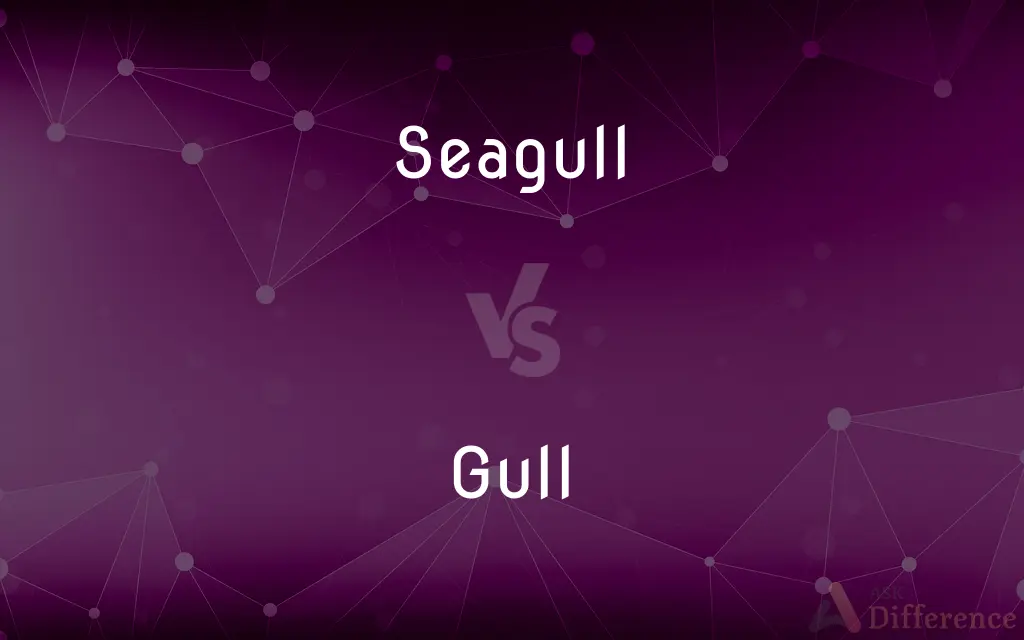Seagull vs. Gull — What's the Difference?
By Fiza Rafique & Maham Liaqat — Updated on March 8, 2024
Seagull refers to various seabird species within the family Laridae, known for their adaptability and omnivorous diet, while "gull" is a broader term for all birds in this family, showcasing the diversity of habitats and behaviors.

Difference Between Seagull and Gull
Table of Contents
ADVERTISEMENT
Key Differences
Seagulls are commonly associated with coastal areas, where they are often seen scavenging for food, highlighting their strong association with marine environments. On the other hand, the term "gull" encompasses species that can also be found in inland habitats, including lakes, rivers, and fields, indicating a wider ecological diversity.
While seagulls are often perceived as nuisances in urban and coastal settings due to their loud calls and aggressive scavenging behaviors, gulls, in general, play important roles in their ecosystems, such as controlling pest populations and cleaning up carrion. This distinction reflects the varied reputations of these birds depending on their specific behaviors and interactions with humans.
Seagulls typically exhibit a white and grey plumage with black markings on the head or wings, a physical trait that aids in their identification. Conversely, gulls can display a wider range of colors and patterns across different species, showcasing the genetic diversity within the family Laridae.
Seagulls are known for their intelligent behavior, such as using tools and working in groups to find food, demonstrating their adaptability. Gulls, encompassing a broader category, also include species with similar levels of intelligence, underscoring the cognitive capabilities of the family as a whole.
Although "seagull" is a term popularly used in everyday language, it is not scientifically precise, as it suggests a specific group within the gull family. Gull, however, is the correct term to refer to any member of the family Laridae, emphasizing the importance of accurate terminology in ornithology.
ADVERTISEMENT
Comparison Chart
Habitat
Primarily coastal areas
Coastal, inland, and urban areas
Perception
Often viewed as a nuisance
Viewed variably, depending on species
Plumage
Mostly white and grey with black
Diverse, including varied colors and patterns
Behavior
Intelligent, tool-using, group foraging
Generally intelligent, behaviors vary widely
Scientific Accuracy
Colloquially used, not precise
Correct term for family Laridae members
Compare with Definitions
Seagull
A bird typically found in coastal areas known for scavenging and loud calls.
The seagull stole a chip right from my hand at the beach.
Gull
Known for their adaptability and intelligence.
Gulls have learned to follow fishing boats for an easy meal.
Seagull
Exhibits intelligent foraging behavior, including tool use.
I watched a seagull use a rock to crack open a clamshell.
Gull
Can inhabit diverse environments, from coastlines to urban areas.
Even far from the sea, you can find gulls rummaging through garbage.
Seagull
Often gathers in large, noisy colonies.
The dock was crowded with seagulls fighting over scraps.
Gull
Plays an ecological role in controlling pests and cleaning up carrion.
Gulls are useful for keeping the beach free of food waste.
Seagull
Noted for their white and grey plumage with distinctive markings.
The seagull’s grey wings were easily spotted against the blue sky.
Gull
A member of the family Laridae, which includes a variety of seabirds.
Gulls were circling the lake, looking for fish.
Seagull
Can adapt to urban environments, scavenging human food.
Seagulls at the park are so used to people, they'll eat right out of your hand.
Gull
Displays a wide range of plumage patterns across species.
The black-headed gull is easily identified by its distinctive coloring.
Seagull
A gull, especially one found near coastal areas.
Gull
Gulls, or colloquially seagulls, are seabirds of the family Laridae in the suborder Lari. They are most closely related to the terns (family Sternidae) and only distantly related to auks, skimmers and even more distantly to waders.
Seagull
Any of several white, often dark backed birds of the family Laridae having long pointed wings and short legs.
Gull
Any of various chiefly coastal seabirds of the family Laridae, having long wings, webbed feet, a thick, slightly hooked beak, and usually gray and white plumage.
Seagull
(orthography) The symbol ̼ , which combines under a letter as a sort of accent.
Gull
A person who is easily tricked or cheated; a dupe.
Seagull
A fan or member of Brighton and Hove Albion Football Club.
Gull
To deceive or cheat.
Seagull
To run in the back line rather than concentrate on primary positional duties in open play.
Gull
A seabird of the genus Larus or of the family Laridae.
Seagull
To use a British Seagull outboard.
Gull
Any of various pierid butterflies of the genus Cepora.
Seagull
(New Zealand) To work as a non-union casual stevedore.
Gull
(slang) A cheating trick; a fraud.
Seagull
Mostly white aquatic bird having long pointed wings and short legs
Gull
One easily cheated; a dupe.
Gull
A swindler or trickster.
Gull
To deceive or cheat.
Gull
To mislead.
Gull
To trick and defraud.
Gull
To deceive; to cheat; to mislead; to trick; to defraud.
The rulgar, gulled into rebellion, armed.
I'm not gulling him for the emperor's service.
Gull
A cheating or cheat; trick; fraud.
Gull
One easily cheated; a dupe.
Gull
One of many species of long-winged sea birds of the genus Larus and allied genera.
Gull
A person who is gullible and easy to take advantage of
Gull
Mostly white aquatic bird having long pointed wings and short legs
Gull
Make a fool or dupe of
Gull
Fool or hoax;
The immigrant was duped because he trusted everyone
You can't fool me!
Common Curiosities
What is a gull?
Any bird belonging to the family Laridae, including all seagulls and other related species.
Are all gulls seagulls?
No, not all gulls are seagulls, as some live in inland or urban areas far from the sea.
Why are seagulls called seagulls?
They're often called seagulls because they are commonly found near the sea, although it's not a scientifically precise term.
What is a seagull?
A common term for various seabirds within the family Laridae, known for living near coastal areas.
Can seagulls live away from the sea?
Yes, many seagulls and gulls can adapt to living in inland or urban areas.
Do seagulls migrate?
Yes, some seagull species migrate, but migration patterns can vary widely among different gull species.
How can I identify a seagull?
Look for birds with white and grey plumage, often with distinctive black markings, near coastal areas.
What distinguishes seagulls from other gulls?
Seagulls are commonly associated with coastal environments, whereas other gulls may inhabit a variety of environments.
Are gulls considered intelligent birds?
Yes, gulls are considered intelligent, with some species showing the ability to use tools and solve problems.
Why do people consider seagulls a nuisance?
Due to their loud calls, aggressive scavenging behavior, and habit of gathering in large numbers in public spaces.
Can seagulls eat human food?
While they can, it's not recommended to feed them, as it encourages dependency and aggressive behavior.
Do all gulls scavenge for food?
Yes, most gulls, including seagulls, have adapted to scavenging, although their diets can vary widely.
Are there any conservation concerns for gulls?
Yes, some gull species face threats from habitat loss, pollution, and climate change, requiring conservation efforts.
What role do gulls play in the ecosystem?
They help control pest populations and clean up carrion, contributing to the health of their environments.
How many species of gulls are there?
There are over 50 species of gulls, each with unique characteristics and habitats.
Share Your Discovery

Previous Comparison
Review vs. Preview
Next Comparison
Sketch vs. SkitAuthor Spotlight
Written by
Fiza RafiqueFiza Rafique is a skilled content writer at AskDifference.com, where she meticulously refines and enhances written pieces. Drawing from her vast editorial expertise, Fiza ensures clarity, accuracy, and precision in every article. Passionate about language, she continually seeks to elevate the quality of content for readers worldwide.
Co-written by
Maham Liaqat














































